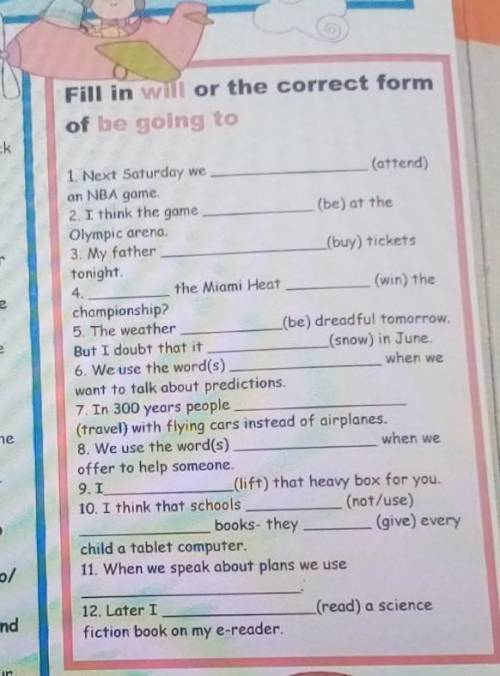Fill in will or the correct form of be going to when we 1. Next Saturday we (attend) an NBA game . 2. I think the game (be) at the Olympic arena. 3. My father (buy) tickets tonight. 4. the Miami Heat (win) the championship? 5. The weather (be) dreadful tomorrow. But I doubt that it (snow) in June. 6. We use the word(s) want to talk about predictions. 7. In 300 years people (travel) with flying cars instead of airplanes. 8. We use the word(s) when we offer to help someone. 9. I (lift) that heavy box for you. 10. I think that schools (not/use) books- they (give) every child a tablet computer. 11. When we speak about plans we use (read) a science 12. Later I fiction book on my e-reader.

Другие вопросы по теме Английский язык
Популярные вопросы
- Имеется два сплава. Первый сплав содержит 10% меди, второй — 40% меди. Масса...
3 - С циркуля и линейки построить треугольник АВС такой, что AB=PQ, A= M, B= N...
2 - Дай определения понятием объект и предмет исследования. ...
2 - Отметь правильные ответы.Неполное доминирование наблюдается, если:1) в потомстве...
1 - Выберите правильный ответ А)СУММА УГЛОВ ПАРАЛЛЕЛОГРАММА РАВНА а) 1800 б)3600...
1 - 1. Построй координатную плоскость и отметь на ней данные точки: (-1;0), (-1;3),...
1 - В яку точку при повороті на кут 90° за годинниковою стрілкою переходить точка...
2 - решить - 1. Мотоциклист проехал 1,5 км. Сила тяги двигателя автомобиля 2 кН....
1 - сделать тест В конце? =250...
1 - Задание 2. Представьте, что Вы фельдшер или медсест- ра в небольшом поселке,...
2
To answer this question, we use the form "be going to" because it is a planned event in the future. We are certain and have already made arrangements to attend the game.
2. I think the game will be at the Olympic arena.
For this question, we use "will" because it is a prediction based on personal opinion. The speaker is not certain about the location of the game and is expressing their thoughts.
3. My father is going to buy tickets tonight.
We use "be going to" in this sentence because it is a planned action in the future. The speaker's father has already made the decision to buy the tickets and intends to do so.
4. Will the Miami Heat win the championship?
In this question, we use "will" because it is a prediction about a future event. The speaker is unsure about the outcome and is asking for an opinion.
5. The weather is going to be dreadful tomorrow. But I doubt that it will snow in June.
Here, we use "is going to" to talk about a future event with certainty, as the speaker is confident that the weather will be dreadful tomorrow. However, for the second part of the sentence, we use "will" because it is a prediction based on doubt and uncertainty.
6. We use the word(s) "will" or "going to" to talk about predictions.
This is a statement rather than a question, and it is explaining that both "will" and "going to" can be used to talk about future predictions.
7. In 300 years, people will travel with flying cars instead of airplanes.
For this statement, we use "will" to express a future event that is not based on personal opinion but rather a general prediction about what might happen in the future.
8. We use the word(s) "be going to" when we offer to help someone.
This is a statement explaining that "be going to" is used to offer help in a future situation.
9. I will lift that heavy box for you.
In this sentence, we use "will" because it is a willingness to do something in the future. The speaker is making an offer to lift the heavy box for someone.
10. I think that schools will not use books - they will give every child a tablet computer.
Here, we use "will" to talk about a future event based on personal opinion. The speaker believes that schools will not use books and will instead provide every child with a tablet computer.
11. When we speak about plans, we use "be going to."
This statement explains that when we talk about plans for the future, we use "be going to."
12. Later, I will read a science fiction book on my e-reader.
In this sentence, we use "will" because it expresses the speaker's intention or decision to read a science fiction book in the future on their e-reader.